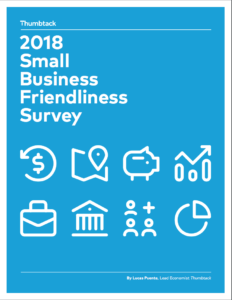 2018 Small Business Friendliness Survey
2018 Small Business Friendliness Survey
Lucas Puente, Lead Economist for Thumbtack
First published August 2018
Since 2012, the Thumbtack Small Business Friendliness Survey has surveyed thousands of entrepreneurs on the state and local public policies that affect their ability to start, operate, and grow a business. It is the largest continuous study of small business perceptions of government policy in the United States.
In 2018, more than 7,500 U.S. small business owners participated in the study, collectively grading 50 states and 57 cities on the government policies that affect their businesses. These skilled professionals operate across a variety of occupations, such as electricians, music teachers, wedding planners, wellness professionals, and more.
In this seventh year of the survey, small business owners revealed four major priorities:
- Small businesses deserve a bigger spotlight. Small business owners increasingly feel that government is prioritizing corporations and large businesses over the small businesses that drive the American economy. Nearly 70 percent of small business owners think their local government cares more about attracting and supporting new corporations, while only 30 percent believe that supporting local small businesses is the priority.
- Health care is still a big financial deal. For small business owners and entrepreneurs, access to affordable health care is one of the biggest policy issues impacting their ability to stay in business. As political rhetoric and posturing affect the costs of monthly health insurance premiums, small business owners want less talk and more relief.
- Mobility remains a challenge. This year, small business owners reported that issues like rising housing prices and increasing transportation costs are making it more difficult to work where they live and travel to customers. Training for the future is key. As new technologies appear and traditional jobs change, training will matter more than ever.
